A Quick Foreword: I’ve always felt there was a narrative gap in the World of Darkness for Kindred born of the vast nomadic cultures stretching from China to Europe and the Gangrel alone simply never felt sufficient to tell all those stories. That’s why I created this clan for my personal chronicle set in Istanbul. -Modern Nights- Naturally, this is homebrew material and departs from much of the official lore. And like any story whispered in the darkness, how much of it is ‘truth’ in these words… Who can truly say? (I’ll touch on some technical and mechanical details at the end of the post.)
YEK
We, The Children of the Sky
“I came from the path, a stranger. I am a traveler. I have seen the rise of empires from the dust of the steppe and watched them return to it. You, child of the West, see history as a line. A story with a beginning and an end. We know better. History is a circle. A song. And I am but one voice in the choir. Listen, and perhaps you will learn the tune.”
Kaan the Wanderer, Dervish of the Yek
You come to me with a name on your lips: Caine. It is the story your kith tells itself in the perfumed salons of Paris and the steel-and-glass towers of New York. A tale of soil, of brothers and murder, of a farmer’s curse. It is a potent story. It has the weight of scripture. It is, for you, the truth.
But the sky is vast, child of the West, and it does not care for the stories.
Our story does not begin in the dirt. It begins in the endless expanse above. We do not speak of a First Sinner, but a First Father: Kayra, the Great Sky. He saw his mortal children flicker like sparks from a fire and, in his unknowable wisdom, chose to grant some of us a greater destiny. He did not curse us. He marked us. He reached down and scooped us from the river of time, setting us on its banks to watch the waters flow forever.
He gave us the curse of undeath, yes, but he also gave us its twin: the Arzu. The Desire. Your kind calls it Hunger, a base physical need. You do not understand. The Arzu is not merely a need for blood. It is a divine yearning, a piece of the Sky-Father’s own eternal ambition placed within our chests. It is the drive to conquer, to master, to be.
Kayra’s gift was not a single mold. Think of it not as a single blessing or a single curse, but as a divine catalyst offered to twenty-four chosen souls. The catalyst was the same for all; but a fire acts differently on water, stone, or dry wood. The result was always shaped by the nature of the soul it touched.
For those of us whose souls were bound to the flesh, the catalyst severed us from the tiresome cycle of decay, but chained our immortal souls to our physical forms. We became the drinkers of blood you call vampires, sustained only by the stolen life of others. We, the Avşar, the Derviş, the Kam, the Servants of Erlik, are of this kind. But for a child whose soul was already intertwined with a great spirit, like the one we know as Börü, the Great Wolf? The catalyst did not bring undeath. It fused his mortal half with his spiritual one, forging a living, breathing warrior of rage and spirit. You call them Lupines. We call them kin. And for others still? Some remained mortal, yet were granted dominion over the elements or the spiritual energies of the East. They were a song with a final, powerful verse, unlike our own endless refrain.
Consider the Gangrel. They are a banner born of the untamed earth, yet they have forgotten their Father’s name. They cling to the Beast within, mistaking its base fury for true strength, unaware they echo a fraction of the Arzu’s divine power. We see the mark of Kayra upon them, even if they are blind to it. We are a shattered sky, you see. Twenty-four banners were raised at the dawn of the world. Some fell. Some, like us, became hunters of the night. Some walk as wolves. Some remained bound to the mortal coil, their power a brief, bright flame. Your story of a single man is a fool’s attempt to fit the sky into a clay pot. Our heritage is not a single curse; it is a pantheon of broken, forgotten possibilities.
Do you see now why your single story of a single man feels so small? Your entire history is built upon a choice, made in a First City your scholars call Enoch. We were there. Ancient tales speak of the Gök Çocukları -the Children of the Sky- who dwelt there not as subjects, but as a wild presence. We refused the laws of the First King. We rejected his walls for the open expanse. To build a wall is to admit you fear what lies beyond it. To live in a city is to chain yourself to one patch of dirt. We have never feared the horizon.
When Caine laid down his Traditions, our ancestors simply laughed and rode away. His laws were for those who needed cages. Perhaps your story is not wrong, merely… incomplete. Perhaps it is the tale told by the ones who stayed behind, who chose the comfort of walls over the terrifying freedom of the open sky. Perhaps your entire history is built upon the memory of the day you forgot who we were.
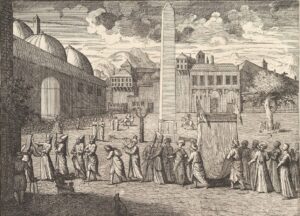
History
Every banner has its own song, child. The Altan Uruk in the East sing of their long war with the Court, and the children of the Hiisi whisper tales of ice and shadow from their frozen forests. This song, the one I sing for you, is but one thread in that vast tapestry. It is the story of the long ride west. The story of my people, whose fate was tied to the hordes and empires that rose and fell between the Danube and the Oxus. We are a shattered sky, and no single shard can reflect the whole.
Our history is not written on stone tablets, child. It is written on the wind. Before Rome, before Babylon, there was the Steppe. And there were we. We rode with the Scythians and the Huns, not always as a part of their hordes, but as their very spirit, a living embodiment of the creed, conquer or be conquered, devour or be devoured.
It was in this age that our two greatest rivalries were forged. In the mountains to the west, we met the Dragons you call Tzimisce. They were creatures of the soil, of static flesh and stagnant pride, building castles from the bones of their enemies. We, children of the sky, knew the earth was a thing to be crossed, not owned. Our war with them was not one of conquest, for what is a fortress to those who call the horizon home? It was a war of philosophy, the wind against the mountain.
Further west, the true sickness of the age festered: Rome. The Ventrue were not warriors; they were merchants of power, hiding behind legions and walls. Their peace was the peace of the cage. When Attila, the Scourge of God, turned his gaze westward, our Avşar kin were the tip of his spear. We did not seek to rule their city of ashes. We simply wished to remind them that no wall is high enough to keep out the sky.
The age of hordes could not last. The world shrinks. We followed the migrations of the Turkic peoples into a land they called Anatolia. A crossroads. And at a crossroads, you must be prepared to meet anyone. At Manzikert, in 1071, we met the heirs of Rome, the Ventrue of Constantinople. Their legions were disciplined but their souls were brittle. When our Avşar kin rode against them, they saw not soldiers, but demons on horseback, their eyes burning with the cold fire of the endless sky. They broke. That day, we taught the West a lesson they have never forgiven: Order is an illusion. We are the truth that shatters it.
This new land also brought us into closer contact with our old rivals, the Banu Haqim. During the Crusades, we fought a common enemy. An understanding was born between professionals, no oath sworn, no blood shared. They needed warriors, we needed assassins. Our paths often cross, but they never merge.
And then a new sickness seeped from the West: the Tremere. Usurpers who did not receive the gift of undeath, but stole it. There are whispers that some of our wandering kin were captured, their essence twisted to create the first of their stony slaves. It is a story we choose to believe, for it gives our hatred a purpose.
So we came to Constantinople, the Queen of Cities. The mortal siege of 1453 was the thunder that masked the true lightning. The real war was fought in the tunnels below and on the rooftops above. We were a coalition of convenience: our Yek banners, the silent blades of the Banu Haqim, the primal fury of the Gangrel, and others united by a common hatred for the city and its arrogant masters. The pact was simple: we would deliver the city to the young Sultan Mehmed, and in return, its shadows would be ours. The city fell. One empire died, yes, but its soul was merely poured into a new, sharper one.
In the heart of this new, magnificent city, many of us believed we had finally found a home worthy of our legacy.
For a time, we tried to rule it as we had ruled the steppe. We chose a great warrior, Orhan, to be the Han of Istanbul. He was a hero, but he learned a swift lesson. This city is not the steppe; it is a serpent that devours itself. He was undone not by a foreign army, but by whispers and betrayal, at the hands of our own kin. It was a failed experiment. We learned our lesson: the Yek are not meant to be kings. We are the storm, not the fortress.
So we adapted. Or perhaps, we simply grew tired. As the decades turned into centuries, the rhythm of the city seeped into our bones. The old chants to the Sky-Father were replaced by the call to prayer from the minarets or the tolling of church bells. It was a practical measure at first, a mask to move among the mortal flocks, but comfort is a slow, sweet poison. The endless horizon of the steppe was replaced by the glittering waters of the Bosphorus. Many of our banners, once eternally nomadic, found a strange peace in the shadows of the mosques and the intrigue of the Topkapi Palace. The city had taught us a lesson the steppe never could: some territories are too rich to be held by one master, and too dangerous to be a constant warzone. After decades of bloody lessons where we tested the resolve of the city’s other masters: the Rum Toreador clinging to their Byzantine ghosts, the Nosferatu in their ancient warrens, the remaining Ventrue with their Roman pride, a different kind of existence was forged. Not one of surrender, but a tense peace born of mutual respect and mutual threat. Istanbul became a bazaar of monsters, a city of unspoken treaties where ancient rivals live on a finely balanced knife’s edge. The nomadic spirit did not die, but it learned to wander the labyrinthine alleys of the Grand Bazaar instead of the open plains.
But empires, like all things, end. When the Ottoman Empire breathed its last, it was not an end for us, but a violent awakening. The Great War tore through our lands, a war where honor was drowned in mud and choked by poison gas. Yet in its fires, we were reforged. Our Clan, who had grown soft, once again felt the righteous fire of the Arzu in the face of foreign invaders. The war left us scarred but sharp. The wisest among us saw that Istanbul was a beautiful tomb, and established a new heartland in the unadorned concrete of Ankara, a fortress of bureaucracy and military loyalty, unseen and underestimated by our rivals.
In these modern nights, the battlefield has changed again. The lands where we and the Banu Haqim once vied for dominance became the prize in a new, greedy game for oil. This shared enemy, this arrogant Westerner who saw only profit in our lands, forced a new, pragmatic alliance. Under the banner of the Ashirra, our Muslim kin lead the fight, but we all lend our strength. A Kam does not need to believe in Allah to despise a cage-builder. Do not mistake this for a war of armies, child. While we slumbered in our comfortable city, the West grew monstrously powerful. Our fight today is one of defiance. A rebellion against an authority that believes it owns the world. It is the struggle of the wind against the mountain, a long, bitter fight to remind the children of the dirt that they will never, ever own the sky.
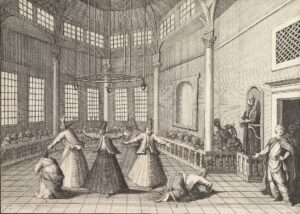
The Soul
“Not all those who wander are lost.”
J.R.R. Tolkien
Among the children of the West, the fire within has a name. It is called the Beast, a rabid dog chained in the soul’s cellar, a thing of shame to be beaten into submission. We know it by a different name. We know the Arzu, the Desire. And it is not a curse. It is our purpose.
The Sky-Father placed within us a spark of his own eternal ambition, a ceaseless yearning to shape the world. This is not a simple need for vitae; blood is merely oil that keeps the lamp from sputtering. The Arzu is a hunger for destiny itself. It speaks to us in the silent hours before the dawn. It does not simply say “feed.” It says “become.” Become the perfect warrior. Become the keeper of secrets. Become the master of your own path.
Weakness: The Soul-Thirst
Our unlife is not a nightly struggle for sustenance. We do not weaken with each passing day. We can walk for a year, sometimes longer, without the base need to feed. But the Arzu within us grows. The divine spark dims, and it demands not a sip, but a sacrifice. Periodically, inevitably, a Yek must kill a sentient being and drain them to the very last drop. We must consume them entirely, body, spirit, and soul, to rekindle the fire of our own existence.
Your kind would call this a weakness. We see it as the ultimate expression of our divine mandate. It is a sacrament. To prove your right to an eternal existence by ending another’s. It is a confirmation of our place in the world: the predator at the apex of all things. This is why we have ridden with the great hordes and stood on the battlements of empires. Our very nature demands conflict. It demands a worthy hunt.
This sacred hunt is governed by the Töre, the unwritten way we carry in our blood. It dictates the how of our existence. Your Camarilla builds its cage from paper. Our laws are as real as the wind.
The Honorable Kill: The Soul-Thirst is a divine act, and it requires a worthy vessel. To kill from the shadows or strike an unsuspecting foe is possible, but it is a joyless meal that tastes of ash and shame. The Töre demands we strive to face our prey in fair combat, to look them in the eye and prove our strength. For some, like the Avşar, this is not a choice but an absolute necessity of their being. For the rest of us, it is the path of honor.
The Spoken Word is a Forged Blade: A Yek’s word is a mountain. To break it is a spiritual rot that other Yek can sense as carrion on the wind. We fear the shame of a broken word more than the Final Death.
The Sanctity of the Guest: The laws of hospitality are absolute. Within a Yek’s haven, a guest is sacrosanct, defended with our unlife. But once the debt of hospitality is paid and the guest has departed, other debts may be collected. Do not mistake our honor for softness.
This philosophy shapes our entire society.
We have no Princes. In a region, the most respected leader may be acknowledged as Han, a first among equals whose authority is earned, not given. We are a confederation of obas: warbands, families, sworn comrades each a sovereign entity. In the old nights, under the endless steppe sky, the trust that held an oba together was forged not just with words, but with vitae. The shared blood, what your kind calls the blood bond, was a tool of survival against the howling wind and the knives of our enemies. But the world shrinks, and the old ways fade. As we settled into the labyrinthine politics of your cities, we learned that absolute loyalty to one person can be a fatal weakness. The blood bond, once a tool of unity, became a chain for many. The tradition has not vanished entirely but for most of us, it is a relic of a harsher, simpler time.
We gather for the Kurultay, a council of consensus. And only in the direst of times do we convene the mythic Ulu Kurultay to elect a Kağan, a supreme war leader.
Why would we bow to a permanent king? Our very existence is a testament to the individual’s will to power, a constant test of our right to persist. A throne is a symbol of stillness. And we, child, are the storm.
Banners
We are a clan of many banners, their struggles as varied as the lands they walk. Some wage a silent war against the corporate despoilers of the frozen north; others still fight ancient battles in the shadows. But here, in the heart of Istanbul, three great banners are the main players. Each follows the Arzu in its own way, finding a different destiny in the Sky-Father’s gift.
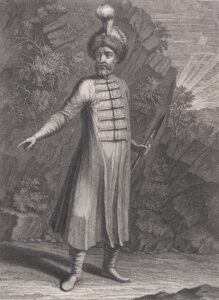
Avşar
The Avşar are the sword-arm and the unblinking eye of the Yek. They are the banner born of the spirit of battle, the children of conflict. From the Scythian horse-lords to the Ottoman Sipahis to the modern-day special forces operator, the Avşar have always been warriors. Their entire existence is a testament to the belief that strength is the only truth that matters, and that conquest is the highest form of prayer. They are pragmatists and survivors, but they are also creatures of immense, fierce pride. They see themselves as the true inheritors of the Yek legacy, the ones who did not shy away into mysticism or philosophy but met the world on its own brutal terms.
Nickname: Hounds, Warlords, Scourges
Weakness: The Honorable Kill is not a choice for the Avşar, it is a necessity dictated by the very nature of their Arzu, but for them, “honorable” refers not to the power of the individual opponent, but to the nature of the fight itself. Their Arzu can only be satisfied when they overcome a worthy challenge. This might mean facing a single, powerful rival, but it can just as often mean plunging into a battle against overwhelming odds, such as a lone Avşar against a squad of trained soldiers. This creates a constant dilemma: for an ancient predator, most one-on-one encounters are not a challenge, but a slaughter. Therefore, they are relentlessly drawn to the crucible of war or the secret conflicts with other supernatural beings, where true tests of skill can be found. Killing a helpless foe or winning a fight without effort will fill their veins with vitae, but it leaves the soul empty and the Arzu burning with the shame of cowardice.
Disciplines: Celerity, Fortitude, Potence
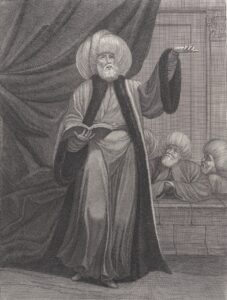 Kam
Kam
The Kam are the spiritual heart of the clan. They are the keepers of the Old Ways, seers and advisors who see the physical world as a mere shadow of the greater reality that lies beyond the Gauntlet. Their Arzu is a hunger not for conquest, but for knowledge, for the secret names of things, for the patterns hidden in the flight of a bird or the flicker of a server light. They are not warriors of the flesh, but of the soul. In an age of cold reason, they are the clan’s connection to the magic that still sleeps beneath the skin of the world, and they are often sought for their wisdom, though their truths are rarely comforting.
Nickname: Shamans, Seers, Mystics
Weakness: The Kam are supernaturally bound to the truth. They cannot speak a direct lie. This does not prevent them from being masters of misdirection, speaking in riddles, or withholding crucial information, but they are physically incapable of uttering a straightforward falsehood. This makes them surprisingly trustworthy advisors, but also puts them at a great disadvantage in the games of deceit that other Kindred play.
Disciplines: Animalism, Auspex, Kut (a unique path of shamanistic magic)
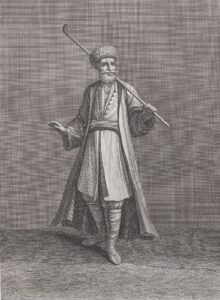 Derviş
Derviş
The Dervishes embody the nomadic soul of the Yek. Their purpose is the journey itself, a perpetual pilgrimage to gather knowledge, stories, and experiences from every corner of the world. They are the clan’s diplomats, spies, and philosophers. While an Avşar measures his worth in scars and a Kam in secrets, a Derviş measures his in the number of roads he has walked and the tales he has to tell. Their Arzu is a hunger for motion, for new horizons. Stillness is anathema to them, and their loyalty is sworn only to the path itself.
Nickname: Wanderers, Storytellers, Fakirs
Weakness: We Dervishes are creatures of the road, and stillness is a poison to our souls. There is no clock that measures its approach, no calendar to mark its coming. But when one of us lingers in a single city for too long, the world begins to close in. The sky feels like a low ceiling. The Arzu, which should be a sharp fire driving us forward. True peace becomes a forgotten memory, replaced by a constant, unbearable wanderlust. The only balm for this withering is the journey itself. We must heed the call of the road, to wander until the horizon feels endless again and our souls can finally breathe.
Disciplines: Celerity, Obfuscate, Presence.
Stereotypes
Banu Haqim: They serve a dead man’s law; we serve the living sky. They are the blade, we are the storm. Professionals we respect, but never trust.
Brujah: A bonfire in a child’s hands. Their passion is a magnificent fire, but they are artless. They scream at cages they could simply walk around. Glorious and tragic.
Gangrel: Our lost cousins. They sleep in the earth and forget the sky. We see the mark of Kayra upon them, but they see only a rival predator. A sadness.
Nosferatu: They chose tunnels over the sky. Masters of secrets. A rat in the walls hears many things, and a wise man knows the value of a rat’s counsel.
Toreador: They build beautiful cages and then weep because they cannot fly. Their obsession makes them predictable, and thus, useful.
Tremere: Thieves. A sickness in the blood of the world who stole their power from our kin. Their pyramids are built on fear, and we will be there to salt the earth when they crumble.
Tzimisce: The Dragon in the mountain, our ancient opposite. One does not hate a mountain; one learns to ride around it, or bring it down stone by stone.
Ventrue: The cage-builders. They believe their walls of paper and gold can hold back the night. They do not understand. We are the wind blowing through the cracks.
Note 1: I’ve intentionally left the exact timing of how often a Dervish must leave a city or how frequently the Arzu demands its due, vague. In my chronicle, I tie these elements to a character’s Humanity rating.
Note 2: I’m aware that the “Soul-Thirst” is a strange weakness and that it fundamentally affects the core concept of the Vampire in the World of Darkness. My friends and I discussed this at length. In practice, the need to still feed on blood to fill their Blood Pool -to use Blood Points- means their nightly habits aren’t drastically different. However, the impossibility of surviving an immortal life without eventually having to kill, even for new vampires, in my opinion, a unique moral depth. I also feel it’s consistent with and complements the clan’s warrior culture. If this change is too significant for your taste, I believe you could simply ignore the clan’s core weakness and use only the branch weaknesses. In that case, an Avşar would still hunt as normal, but their prey would need to be “honorable” as described.
Note 3: I have almost entirely disregarded the events of Constantinople by Night and the Istanbul sections of Beckett’s Jyhad Diary, taking only inspiration where it fit. While I think both are great stories, the details didn’t align with the vision I had for the city. I’m planning to share more homebrew content about my version of Istanbul.
Note 4: Just so you know, this post is condensed from pages of notes and a 30-page guide for my players. That means I have plenty more lore and details, so feel free to ask away in the comments!
Note 5: I received some feedback about the Avşar clan having Celerity, Fortitude, and Potence all together. I guess I could have used Animalism instead of Celerity.
Note 6: Yes, other clans mostly see Yek as a Gangrel bloodline.
Note 7: Someone on Reddit suggested swapping Celerity with Presence for the Avşar, and honestly it made a lot of sense. It helps separate them from the Dervishes as speedsters and fits better with the Avşar’s proud, honorable style and feels more in line with their identity as commanding warriors who face their enemies directly.
Art, From Cover to the Bottom
-The Metropolitan Museum of Art, New York-
1- Gift of Cornelius Vanderbilt, 1887
2- Harris Brisbane Dick Fund, 1932
3- Harris Brisbane Dick Fund, 1932
4- Bequest of Mrs. Charles Wrightsman, 2019
5- Bequest of Mrs. Charles Wrightsman, 2019
6- Bequest of Mrs. Charles Wrightsman, 2019
Discover more from Anatolian Creative
Subscribe to get the latest posts sent to your email.


No responses yet